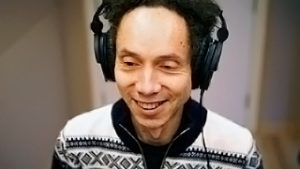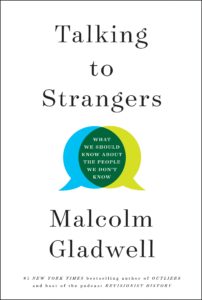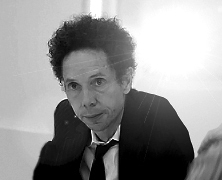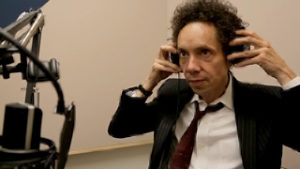 Malcolm Gladwell is the author of five international bestsellers: The Tipping Point (2000), Blink (2005), Outliers (2008), What the Dog Saw (2009) and David and Goliath (2013). He is the host of the podcast Revisionist History, co-host of the music podcast Broken Record, and staff writer at The New Yorker. He was named one of the 100 most influential people by Time magazine and one of Foreign Policy’s top 100 Global Thinkers. Previously he was a reporter with the Washington Post, where he covered business and science, and then served as the newspaper’s New York City bureau chief. He graduated from the University of Toronto, Trinity College, with a degree in history.
Malcolm Gladwell is the author of five international bestsellers: The Tipping Point (2000), Blink (2005), Outliers (2008), What the Dog Saw (2009) and David and Goliath (2013). He is the host of the podcast Revisionist History, co-host of the music podcast Broken Record, and staff writer at The New Yorker. He was named one of the 100 most influential people by Time magazine and one of Foreign Policy’s top 100 Global Thinkers. Previously he was a reporter with the Washington Post, where he covered business and science, and then served as the newspaper’s New York City bureau chief. He graduated from the University of Toronto, Trinity College, with a degree in history.
Gladwell was born in England but grew up in rural Ontario, in an area that has a large population of Mennonites. His parents originally attended a Presbyterian Church when they moved to Canada, but his family are now members of the Mennonite Church. In a 2013 interview with Sarah Pulliam Bailey of the Washington Post, he talked about how at one point he had “drifted away a little bit” from his early religious beliefs, but that the process of writing his book David and Goliath started him on a journey of “rediscovering my own faith again.”
Gladwell’s latest book, Talking to Strangers: What We Should Know about the People We Don’t Know, will be coming out in September 2019. The book explores an enticing variety of stories from history and modern times, such as the deceptions of Bernie Madoff, the trial of Amanda Knox, the suicide of Sylvia Plath, and the meeting between Spanish conquistador Hernan Cortes and the Aztec ruler Montezuma II. In each, Gladwell examines how our interactions with strangers often go terribly wrong, and why. Typical of Gladwell’s writing, the stories in the book are curious, compelling, disturbing – and always enlightening. Talking to Strangers takes us on a guided tour of some riveting shipwrecks, to help us better navigate the choppy waters of our present times.
As longtime fans of Gladwell’s books, and now regular listeners of his podcasts, we were excited to have the opportunity to chat with him about his new book, his adventures in the podcast world, recent political trends, the media, and how we can gain a truer, more personally empowering picture of our society.
Here are some audio highlights from our conversation – with thanks to Meydän for sharing his beautiful music:
(5:25 min.)
Interview by Bill Locke
KOLBE TIMES: I’m delighted to have this chance to talk about some of your latest endeavours, and of course, your new book, which comes out this fall. First of all, can we talk a bit about Pushkin Industries, which is a podcast company that you’ve set up with your friend Jacob Weisberg?
MALCOLM GLADWELL: Sure!
 KOLBE TIMES: You’ve got some great podcasts being produced at Pushkin Industries, which we really enjoy. I’ll mention a few of them – Revisionist History, which has been around for a few years now; Broken Records, where some of your favourite musicians are interviewed – a lot of fun to listen to; and one of Pushkin’s newest podcasts, Solvable, where some of the world’s biggest thinkers talk about how they’d solve some of the world’s biggest problems. A while back you described the difference between writing books and creating podcasts this way: “You think with your eyes, and you feel with your ears.” Do you still think that’s an accurate description?
KOLBE TIMES: You’ve got some great podcasts being produced at Pushkin Industries, which we really enjoy. I’ll mention a few of them – Revisionist History, which has been around for a few years now; Broken Records, where some of your favourite musicians are interviewed – a lot of fun to listen to; and one of Pushkin’s newest podcasts, Solvable, where some of the world’s biggest thinkers talk about how they’d solve some of the world’s biggest problems. A while back you described the difference between writing books and creating podcasts this way: “You think with your eyes, and you feel with your ears.” Do you still think that’s an accurate description?
MALCOLM GLADWELL: To some extent, yes. It’s certainly easier to handle emotional topics through voice…and it is harder to be analytical when all you have is voice. Each of these two mediums have their own sets of strengths and weaknesses, and I think it’s true that podcasts are particularly good at dealing with emotionally difficult or emotionally meaningful topics.
KOLBE TIMES: What would be one of the highlights for you from doing the podcasts?
 MALCOLM GLADWELL: The ability to reinvent yourself at the age of 50. It’s kind of fun. It’s a surprisingly different kind of art form than writing for print. I thought it was going to be quite similar, and I was happily proved wrong. It’s much more of a team effort, which is something that I’ve realized I really love. And you tell different kinds of stories, you know, you just, you’re much more dependent and invested in the people that you’re talking about, because you need their voice – whereas when you’re writing for print, someone’s not present in the same way.
MALCOLM GLADWELL: The ability to reinvent yourself at the age of 50. It’s kind of fun. It’s a surprisingly different kind of art form than writing for print. I thought it was going to be quite similar, and I was happily proved wrong. It’s much more of a team effort, which is something that I’ve realized I really love. And you tell different kinds of stories, you know, you just, you’re much more dependent and invested in the people that you’re talking about, because you need their voice – whereas when you’re writing for print, someone’s not present in the same way.
KOLBE TIMES: One thing that seems to be a thread in your work – in your books and articles, and also your work as a podcaster and speaker – is that you’re very good at helping people navigate the changing world around us and deal better with the future. And in particular you do this by looking closely at past events and thinking about what we can learn from them going forward. Can you talk about that a little bit?
MALCOLM GLADWELL: Well, you know, I’m rarely explicitly focused on the future or on anticipating trends. As the title of my Revisionist History podcast would suggest, I tend to be much more interested in making sense of things that have already occurred – and it’s the same in my journalism. But exposing the roots of events and looking at where all the changes that we’re experiencing come from can be an enormously useful enterprise. I suppose mostly this could be in terms of helping people develop the right set of attitudes to handle change. You know, a lot of my work is concerned with – particularly my recent book – a lot of it is about the importance of humility and caution in making sense of other people; strangers. But that’s a theme that runs through a lot of my work. The reason that you expose the complicated roots of something is you’re trying to instruct people to be wary of making hasty conclusions or superficial readings of things that are going on around them.
KOLBE TIMES: What led you to write your latest book, Talking to Strangers?
MALCOLM GLADWELL: The specific thing that led me to write it was the Sandra Bland story, this kind of heartbreaking story of a woman, you know, pulled over on a routine traffic stop in Texas, and who ends up dead in her cell two days later. It was one of the more high-profile of that wave of police cases that caught everyone’s attention years back. More generally it was that I came to understand that that problem, that problematic encounter that she had, was in some sense typical, in the sense that many of the high profile cases that concern us and trouble us are examples of the same thing – which is they are examples of the fact that the modern world throws us into contact increasingly with people we know nothing about…and that we are ill equipped for those kinds of encounters.
And so you know, each chapter in the book is about a different high profile recent case. And they’re all fundamentally, I think, versions of the same problem, which is this: the skills that we develop as human beings work well when we’re dealing with people we know, but they just don’t work well when we’re with people we don’t know. So the question is why? Why don’t they work well, and what can we do about it? That’s really what the book is focused on.
KOLBE TIMES: And I think you point out in the book that all of us, whether we’re ordinary people or judges or professional interrogators, we all sometimes have to question our approach and, as you say, be more humble and cautious. What other advice can you give, in terms of discerning character or better understanding the stranger that we’re talking to?
MALCOLM GLADWELL: Well, the first thing would be to adjust your view of your own competence level. In other words, you’re probably not going to be able to do nearly as good a job as you think you can in making sense of someone in the time that you have.
I deal a lot in the book with deceit, so the second thing I would say is that because we are by nature trusting – appropriately trusting – individuals, and that’s how we have built a modern functioning society, that innate level, that default to trust, makes us easy to be deceived. Deception is not a result of us failing at the task of being human. It is the result of us succeeding at the test of being human. The cost of being a functional, trusting, productive member of society is that you will inevitably be deceived. And we should stop jumping up and down with outrage whenever people are deceived. Being deceived is the most human of traits.
 I also think that in writing this book I spent a lot of time thinking about this: How do we protect each other from our failures with strangers? For instance, I have a chapter that deals with alcohol. When you understand precisely how alcohol distorts human behaviour, and how problematic alcohol is when it is introduced into an encounter between strangers, you become a lot more aware of the dangers of alcohol – and probably a lot more militant in trying to put limits on alcohol, particularly as it used by teenagers and young people. So there are specific areas where I think this kind of discussion can take us, in terms of making our world function better.
I also think that in writing this book I spent a lot of time thinking about this: How do we protect each other from our failures with strangers? For instance, I have a chapter that deals with alcohol. When you understand precisely how alcohol distorts human behaviour, and how problematic alcohol is when it is introduced into an encounter between strangers, you become a lot more aware of the dangers of alcohol – and probably a lot more militant in trying to put limits on alcohol, particularly as it used by teenagers and young people. So there are specific areas where I think this kind of discussion can take us, in terms of making our world function better.
KOLBE TIMES: I’m sure that in writing and researching and interviewing people, you must be impacted personally by their stories.
MALCOLM GLADWELL: Yeah, it’s impossible to write a book and not be impacted in a million different ways. I mean, some stories are very uplifting, and extraordinarily powerful reminders of the capacity of human beings to rise above their baser instincts, and rise above themselves – like the Wilma Derksen story in my book David and Goliath, which had a big impact on me.
My new book is largely about the opposite kind of situation, and many of the stories in it have affected me in a negative way – the Sandra Bland story being the principle one. Her story is the one around which the whole book is organized. The reason I chose that story is that I continue to find it to be devastating – tragic on every level, and for all parties involved, not just for Sandra Bland. So yeah, it was a different kind of emotional response, but probably an equally powerful one.
KOLBE TIMES: Can you briefly remind our readers about the Wilma  Derksen story?
Derksen story?
MALCOLM GLADWELL: Sure. It’s the story of a woman and her husband who live in Winnipeg, Manitoba. They grew up in the Mennonite religious tradition. Their young daughter is kidnapped, sexually assaulted and murdered. Before the police even find their daughter’s assailant, the Derksens stand up to say that they forgive this person. Then, after a man is arrested, they continue in publicly stating that they would like to seek reconciliation and offer forgiveness to him. It’s as simple as that. A woman goes through the absolute worst thing that could conceivably happen to a mother and then reaches for the most unlikely of states in response, which is that she would like to forgive the person who murdered her daughter. I cannot think of a single human act that is as difficult as that. And Wilma Derksen did it.
I think her story serves as a powerful reminder of the redemptive power of forgiveness, the ability of religious faith to move people – and the ability of human beings to, as I said, rise above themselves. That story is so extraordinarily powerful on so many levels.
KOLBE TIMES: It is. I remember reading it and being very moved. We don’t hear stories like that very often in the news; stories that inspire us and bring us together. Can you comment on that?
MALCOLM GLADWELL: In America, we’re going through a period of unusual political divisiveness. And I think it’s very easy to conclude from that, that ordinary Americans are as divided as their politicians are. And if you talk to ordinary Americans you discover that this is not true.
You know, it’s so easy to exaggerate. If all you do is consume accounts of catastrophes, division, incompetence, evil – well, you can get a very skewed picture of the world. I think it’s very important for people to balance that picture of divisiveness with the truth, which is that most people in the United States probably agree on way more things than they disagree on. But we’re in a particular moment where it is in the interest of a number of different parties to exaggerate differences, and to seek to profit from them.
KOLBE TIMES: I know many people wonder why the media so often steers towards negative issues, and focuses on the potentially worst outcomes.
MALCOLM GLADWELL: Well, there’s a legitimate reason and an illegitimate reason. It is the job of the mass media to deal with problems. So, if there is a scandal, or if there is an outrage, or if there is a bad law or a misbehaving politician, it’s the job of the media to put a focus on those things so they can be fixed or righted. So institutionally, there is an appropriate bias in the media towards the things that are not going well.
But at the same time, I think there is an understanding – a more cynical understanding – that there’s more money to be made in depressing and angry news, and stories of dysfunction, than there is in things that might more accurately reflect the general society. I don’t think it’s always appropriate to just blame the media. I think it’s up to citizens – people who consume this stuff – to understand what they’re consuming and moderate it, and fill their life with experiences that allow them to see a proper picture of what their society is like.
KOLBE TIMES: And those kind of experiences, often in community with others, can give us a more balanced perspective on things, as you said before – and keep us moving forward in positive directions.
MALCOLM GLADWELL: Exactly. You know, there are many reasons, for example, to go to church on Sunday morning. There’s a religious and a spiritual reason. There’s also a social reason. And that is that what a church is, and has historically been, is a place where people who may disagree during the week come to agree on Sunday. It is one of those experiences that reminds you that people are not helplessly divided; that on the things that really matter, there are fundamental agreements. And there are a lot of things that function that way still in society, and I think it’s very important for us to keep those institutions alive, because they are the ones that balance this account of the world, and powerfully remind us that all is not lost, and we are not hopelessly divided.
KOLBE TIMES: Well put. What a great way to end our time together. Thank you for spending time with us today.
MALCOLM GLADWELL: Thank you very much.
Images courtesy of Malcolm Gladwell









